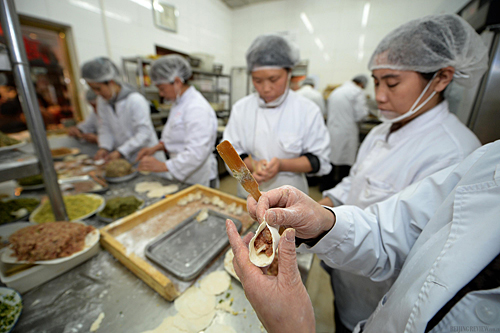|
 |
|
LABOR INTENSIVENESS: Kitchen workers make dumplings in a restaurant in Beijing on February 4 (LI XIN) |
As of April 25, nine local governments in China had raised their minimum monthly wage standards by an average of 13.2 percent this year, according to the Ministry of Human Resources and Social Security (MHRSS).
The nine provinces, municipalities and cities were Chongqing, Shaanxi, Shenzhen in Guangdong, Shandong, Beijing, Shanghai, Tianjin, Shanxi and Gansu.
After the increases, Shanghai still records the highest minimum wage standards in China. The city's minimum monthly wage standard is 1,820 yuan ($291.75), and the minimum hourly pay is 17 yuan ($2.73).
Official statistics show that minimum wage increases continue to slow compared to previous years. In 2011, 24 provinces, municipalities and autonomous regions raised their minimum wage by an average of 22 percent. The average increase slowed to 20.2 percent in 2012 and then 17 percent in 2013.
Despite the slowdown, the rise of local minimum wages in general has been faster than that of the GDP and average resident income growth of the nine regions, according to the MHRSS.
An employment promotion plan issued by the Central Government in February 2012 stipulated that local minimum wages are to rise at least 13 percent on an annual basis during the 12th Five-Year Plan (2011-15) period. As a result, the minimum wage will hopefully reach at least 40 percent of the average wage level in most areas in 2015.
A guarantee line
As early as 1984, the Chinese Government recognized the Minimum Wage Treaty implemented by the International Labor Organization. However, it was not until 1993 that the first regulation on minimum wages in China was issued by the then Ministry of Labor. In July 1994, a minimum wage system was included as part of the Labor Law. Article 48 of the law states that all types of enterprises in China must comply with their local minimum wage standard.
According to the Opinions on Issues Concerning the Implementation of the Labor Law, which was issued by the Ministry of Labor in August 1995, the minimum wage does not include overtime pay, allowances for working in unfavorable conditions nor the social insurance and benefits that are required by law.
The Ministry of Labor and Social Security, which replaced the Ministry of Labor in 1998, issued a new regulation on minimum wage in 2003. The new regulation, which took effect on March 1, 2004, mandates that the minimum monthly wage for full-time employees and the minimum hourly wage for part-time employees should be adjusted at least once every two years. It also requires that local governments should set the minimum wage according to five factors: the average living expenses for local urban residents, workers' social insurance and housing fund contributions, the local average wage, the local unemployment rate and local economic development.
China's first minimum wage system was intended to prevent the exploitation of workers especially in the export-oriented processing and manufacturing industries that were flourishing in the country. The minimum wage system effectively increased the income of many workers.
| 